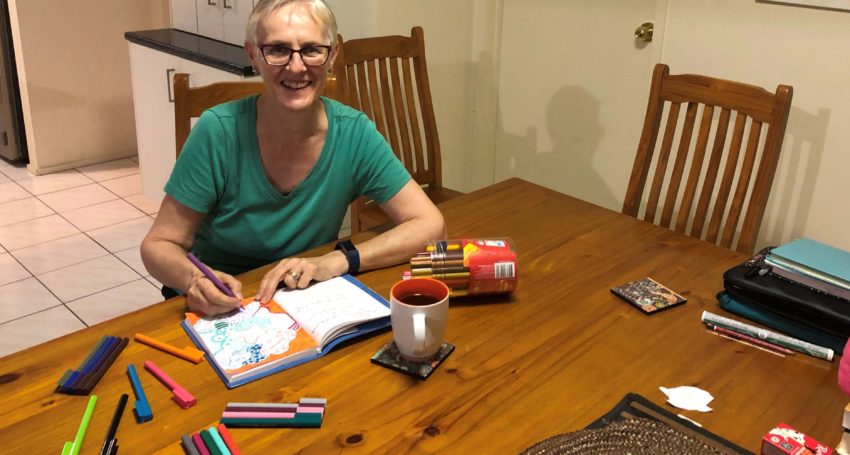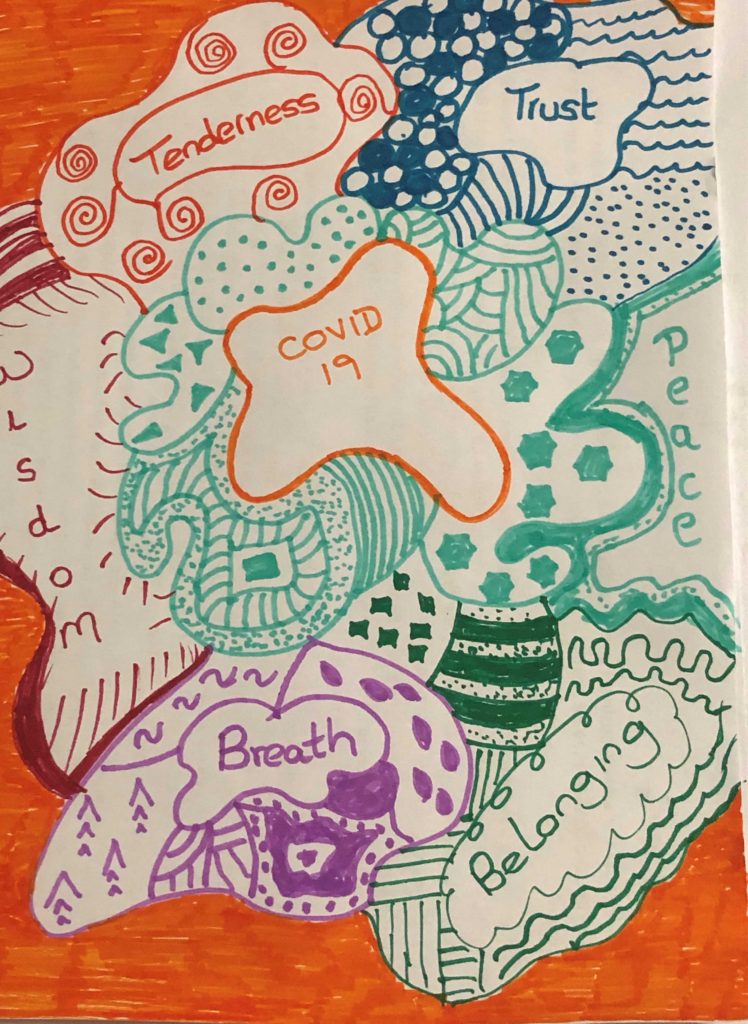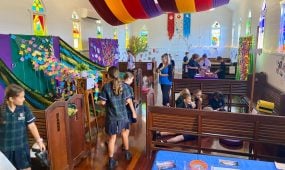Finding myself in an enforced sabbath
Features
“If we all hold our world before God in this time, we will surely come through this period with a deeper faith and a greater intimacy with God and one another…and if you find yourself in an enforced sabbath, as I have, sing (and draw) praise to God,” says The Rev’d Penny Jones

Many significant events in our work and social calendars have been postponed or shifted online as we collectively seek to flatten the COVID-19 curve and protect the most at-risk in our communities. As churches, and other gathering places, have had to find other ways to connect their people, we are consequently navigating our way through what this means, emotionally, physically and spiritually. However, mingled with understandable disappointment, regret and anxiety, there has been a different emotion for some of us – relief. Relief that decisions have been reached and that overall safety measures have been embraced by the community. And, also relief that a space, a ‘sabbath rest’, has suddenly appeared for some of us. It is of course not a time of rest for our hardworking front-line medical staff, food producers, retailers, other essential services personnel – we are certainly learning what is ‘essential’ – and many other workers. However, for some, an unexpected period of less, or very different, activity is emerging.
Now, it is very easy for other things to simply rush in to fill the space, such as a sudden urge to cleanse the entire house with disinfectant and an earnest searching for other ways to communicate (like writing this reflection!). Yet the quiet voice in my soul says something different: that this unprecedented time is about being for me, not doing; about rediscovering who I am and what is truly important. Our world and church have become extraordinarily activist. We have filled our agendas with often frenzied activity. The balance of action and contemplation has tipped decidedly towards action. So, enforced inactivity and seclusion may go some way to redressing this for those who can take time out. For some at least, this offers time to reconnect deeply with God and to hold the space gently in prayer as a labour of love, engaged for the sake of the world. Denied the Eucharist, we are to discover how to be the Body of Christ for the world from our own homes. For those of us who are entering into a prolonged sabbath, how can we engage with this time?
Two Sets of Six ‘S’ words
Many of us are encountering six key ‘s’ words – shock, stress, suffering, sacrifice, separation and saturation. Let’s explore each alongside six other words that can emerge from the sabbath space – sing, stabilitas, sanctify, scripture, solidarity, silence.
Shock – Sing/Sketch
COVID-19’s rapid spread and consequences present a significant shock to our individual and collective lives. It is therefore natural to feel fear, numbness, denial, rage and withdrawal. How can we retain trust and groundedness in God? One way is to sing because singing opens our hearts and lungs and enables praise and lament. So, sing along to your favourite praise songs or Taize chants – find opportunities, if only in the shower! And sing songs of lament, as well as praise, because it is so important to give voice to all our feelings. If music is not your thing, read aloud from the book of Psalms, which gives expression to every human emotion before God.
Advertisement
Maybe however, like me, you find it easier to put things on paper? Keeping a journal will then be important, not least to have some ‘alone’ time, even in a crowded space. Even those who struggle with drawing can find solace in doodling. If you are uncertain how to begin, I suggest Sybil MacBeth’s technique called ‘Praying In Colour’. Essentially ‘praying in colour’ uses sketching, doodling and colouring to be still and listen to God. Make a shape on a page, draw the person or concern for which you want to pray in the middle, and then doodle around it quietly until you feel your prayer is complete. Then make another shape and continue similarly until your page is full and your prayer is at an end – then say ‘Amen’. While the hand is occupied, the mind can come to stillness and know God’s peace.

“Essentially ‘praying in colour’ uses sketching, doodling and colouring to be still and listen to God. Make a shape on a page, draw the person or concern for which you want to pray in the middle, and then doodle around it quietly until you feel your prayer is complete. Then make another shape and continue similarly until your page is full and your prayer is at an end – then say ‘Amen’. While the hand is occupied, the mind can come to stillness and know God’s peace”
Stress – Stabilitas
When under stress we must also take the usual practical steps to help ourselves – establish new routines, eat well, find ways to exercise for at least 20-30 minutes daily, keep things clean and tidy and, of course, wash our hands. It seems likely that we will increasingly be confined to home. For our hyper-mobile culture this is a shift. It will help greatly if we can see this as a time to appreciate our homes and their immediate localities. In his Rule, the great monastic Saint Benedict asks for the alternative vow of ‘stabilitas’, so that communities can be built on sound foundations of fairness and common understanding.
A very simple spiritual practice to help us remain in the present and value our immediate location is making a list. I do not mean a shopping list, but rather a list, for example, of those we love; of things we love in our home; of encouraging scripture verses; and, of things for which we are thankful. We can list the sounds we hear, the tastes we love, and the prayers we know by heart.
Suffering – Sanctification
There is increased suffering around at present. COVID-19 has brought illness and death to many. And, loss of work, livelihood, home and security have variously come to many more. All of us have suffered uncertainty at some point in recent times. It is thus very important that we maintain perspective. In the words of the 14th century mystic Julian of Norwich – who survived the plague multiple times, along with the loss of many dear to her – God did not say “thou shalt not be tempested, thou shalt not be travailed, thou shalt not be dis-eased,” but rather, “thou shalt not be overcome’.
Advertisement
So, can we see this time as one of sanctification – a time set apart and capable of being made holy? How we answer will shape how we are as a world and church at the end of this challenging period. For now, we must do little things with great love. We could thus light a candle in our window each night as darkness falls. When we do that with love for the world, we help send God’s light into our world and keep hope alight. If lighted flames seem too dangerous, and battery versions hard to find, consider drawing a picture of a candle or a rainbow and pinning that in your window instead.
Sacrifice – Scripture
We are all being necessarily asked to make sacrifices for the health and wellbeing of others and we may increasingly need to do so. It is important to make these sacrifices from a place of love, constantly asking God to soften our hearts. As Ephesians 5.2 expresses it, “live in love, as Christ loved us and gave himself up for us, a fragrant offering and sacrifice to God.”
To keep our hearts open to offering joyful sacrifice, it will be helpful to turn every day to our scriptures. One way is through the ancient practice of Lectio divina (‘divine reading’), which has been practised since around 300 AD. In this method we allow a few words of spiritual writing settle into our heart by reading them aloud three times. The first time we ask God which word or phrase we need to hear in the passage. The second time we seek the Spirit’s guidance to know how that phrase is speaking into our current lives. The third time we ask God to hear our specific prayer request and help us. To know more, including how to use lectio divina in journaling, Google ‘lectio Divina’ and find a resource that suits you, such as the Sacred Pilgrim podcast, which provides an audio version daily.
Separation – Solidarity
One of the most difficult things to navigate and sustain is the need for social distancing, or ‘physical distancing’ as some prefer to call it as the latter emphasises that we can still be relational and connected. As social animals, keeping one another at a safe and necessary distance is challenging. However, while we need to maintain a temporary physical distance from those we would usually embrace and while some of us need to shelter in our homes because we are at higher-risk, we can still be social. Indeed, we can connect with one another by every means still open. Globally, we now have a different kind of solidarity with humans everywhere who are encountering similar difficulties. So, we can list the people we intend to contact every day or week, helping ensure we keep that intention, whether by phone, Facebook, Zoom or otherwise. Many parishes live stream services and sermons, send out reflections and connect through digital technology. Learning about new technologies has been a steep learning curve for many, but well worth it for those who have stepped up to the challenge. If the telephone is your only means of connection, seek connection with someone who has more technology available and ask them to read you somethings they see online. In my Parish of Milton, I am publishing a two-minute video on our Facebook page daily to offer solidarity with others. Many other groups are offering online resources for sustenance. For our excellent Diocesan adult education resources, visit the FormedFaith team’s website.
Saturation – Silence
We are being saturated and overwhelmed by news coverage. While it is socially responsible to update ourselves, too much news consumption is unhealthy. Instead, consider spending the 20 minutes you might spend listening to another news bulletin in silent meditation. Allowing our whole being time to rest in God’s love is immensely valuable. It will boost your immune system and help you retain perspective. The Centering Prayer Network and World Community of Christian Meditation both have mobile apps and are offering online seminars.
If we all hold our world before God in this time, we will surely come through this period with a deeper faith and a greater intimacy with God and one another.
So, in distress, find blessing; in anxiety, seek gratitude; and, if you find yourself in an enforced sabbath, as I have, sing (and draw) praise to God.






